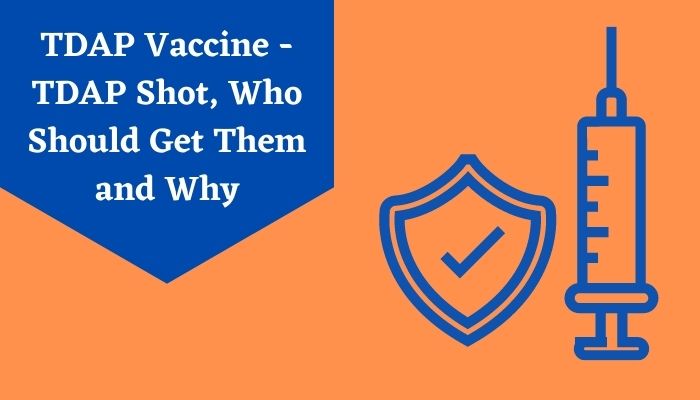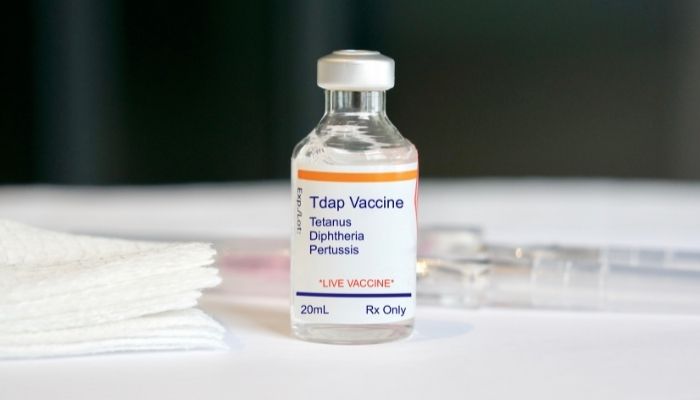The Tdap vaccine is a popular combination vaccine that safeguards preteens and adults against three lethal diseases: tetanus, diphtheria, and pertussis (whooping cough). Though developed countries may not have tetanus and diphtheria still, whooping cough spread is common in these countries.
What is the Tdap Vaccine?
The Tdap represents tetanus (T), diphtheria, (D), and acellular pertussis (aP). The Tdap vaccine was introduced in 2005 for older children and adults. Before 2005, there was no pertussis vaccine (whooping cough) available in the market for anyone above 6 years.Tdap shot has many dissimilarities with the DTaP vaccine (diphtheria, tetanus, and whooping cough). DTap is primarily given to infants and children in five doses, starting at 2 months of age. On the other hand, Tdap can be given to anyone above 7 years. Tdap vaccine is not a live vaccine; hence, it can’t cause these diseases (tetanus, diphtheria, and pertussis).
1. Tetanus
Since this is not a communicable disease hence, it doesn’t spread from person to person. The bacteria that are responsible for this disease are commonly found in soil, dust, and manure. The bacteria invade your body through breaks in the skin.Tetanus is also known as lockjaw because tightening of the jaw muscles is one of the prime signs of this infection. Tetanus is responsible for several other health issues, including difficulty in opening your mouth and swallowing, breathing problems, or even death.
But tetanus is uncommon in developed countries like the USA, where only 30 cases are reported every year.
2. Diphtheria
The strains of bacteria are responsible for diphtheria. The bacteria are usually transmitted through respiratory droplets, coughing, or sneezing. People may catch diphtheria from open sores or ulcers that are contaminated with bacteria.The bacteria attack your respiratory system thus, you may experience some symptoms like
- Weakness
- Sore throat
- Mild fever
- Swollen glands in the neck
3. Pertussis
The Tdap vaccine gives you the utmost protection against whooping cough. Whooping cough can be enervating and may last for months. This can cause irrepressible and vigorous coughing that makes it difficult to breathe or consume food or drinks.Tdap also safeguards infants who are too young to get vaccinated against whooping cough. Whooping cough can spread from parents, siblings, and grandparents to infants.
Whooping cough vaccination for young children was introduced in 1940. But protection against the disease naturally weakens over time, so the Tdap booster vaccines are required to improve immunity. Consult a healthcare professional who will make a detailed review of vaccine history for you and your baby.
What are the Notable Side Effects of the Tdap Vaccine?
The side effects are not the new-fangled things for vaccines. Every vaccine comes up with some side effects and the same goes for Tdap also. But reported side effects are very mild and negligible with Tdap and they may dissolve on their own.Some mild-to-moderate side effects can be,
- Mild pain, redness, or swelling at the injection site
- Fatigue
- Body aches
- Headache
- Nausea or vomiting
- Diarrhea
- Mild fever
- Swelling at the vaccination site
In some rare cases, the severe side effects of the Tdap vaccine have been reported. They could be,
- Excessive swelling
- Unbearable pain
- Bleeding at the injection site
- Very high fever
Some people may experience allergic reactions within a few minutes to a few hours of the vaccine. These reactions could be hives, swelling of the face or throat, breathing difficulty, faster heart rate, and dizziness.
If you have experienced any of these symptoms after getting the Tdap vaccine, consult a doctor immediately.
Cost of a Tdap Vaccine
Most private insurance plans bear the cost of this vaccine. The cost of this vaccine in India is Rs. 1143.12. Many local bodies and government hospitals are offering this vaccine without any cost to underprivileged children.Tdap Vaccine During Pregnancy
The CDC recommends any pregnant woman can take this Tdap vaccine anytime between weeks 27 and 36 of pregnancy.If you are expecting and take Tdap pregnancy, then whooping cough won’t get transmitted to the newborn. Infants get more severe symptoms, including life-threatening complications from whooping cough.
Tdap Vaccination Schedule
Depending on your age and history, your doctor will recommend your vaccination schedule and dosage.- Ages 11 to 12 years: 1 dose Tdap
- Pregnancy: 1 dose Tdap during each pregnancy, mostly between 27 to 36 weeks
Catch-up Vaccination
Ages 13 to 18 years who haven’t received Tdap: 1 dose Tdap, then a Td (to prevent tetanus and diphtheria) or Tdap booster every 10 yearsAges 7 to 18 years who aren’t fully vaccinated with DTaP: 1 dose Tdap as an integral part of catch-up series (preferably the first dose); if add-on doses are needed, use Td or Tdap
Tdap Administered at Ages 7 to 10 Years:
Children (7 to 9 years) who got Tdap should receive the routine Tdap dose at ages 11 to 12.
Children aged 10 who got Tdap don’t need to receive the routine Tdap dose at ages 11 to 12.
Who Should Get the Tdap Vaccine?
If you are above 18 years, you should get a dose of Tdap instead of your next Td (tetanus and diphtheria) booster if:- You have never received the Tdap vaccine
- You can’t recapitulate whether you had the Tdap vaccine
A Td booster is applied every 10 years with a single injection in the upper arm.
You must take a Tdap booster before the 10-year interval if
- You are in close contact with an infant younger than 12 months
- You are pregnant
Who Should Avoid Getting the Tdap Vaccine?
Though the chances of allergic reactions are very low with the Tdap vaccine, still some people should avoid this vaccine and they are,- People who experienced a previous lethal allergic reaction to any vaccine that contains tetanus, diphtheria, or pertussis
- People who were in a coma or had seizures within 7 days of a childhood dose of DTP or DTaP, or a previous dose of Tdap
- Anyone below 7 years old
Inform your doctor if you have Guillain-Barre syndrome or noticed excessive pain or swelling after any previous vaccine containing diphtheria, tetanus, or pertussis.



